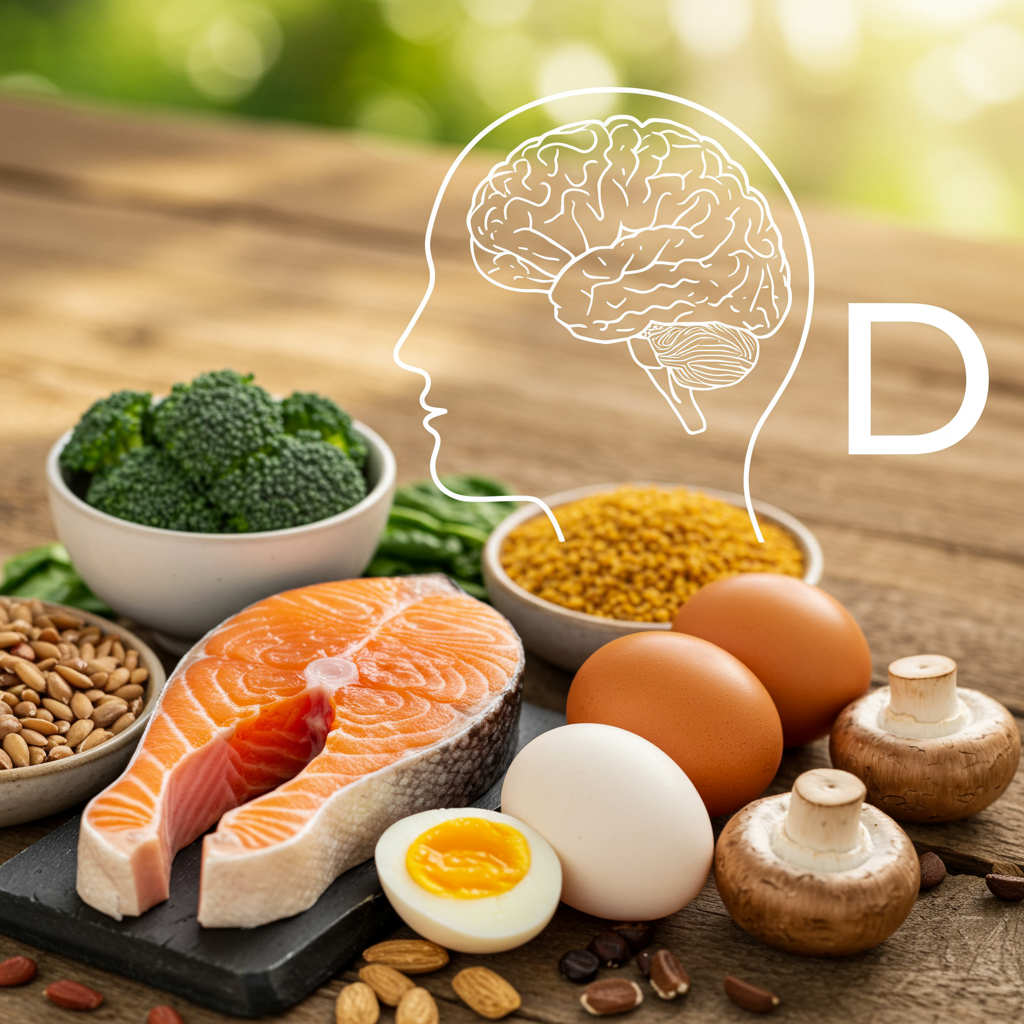Did you know that the sunshine <a href="https://news.quantosei.com/2025/06/29/scientists-just-connected-these-foods-with-an-80-lower-risk-of-cognitive-decline/" title="Unlock brain Health: Foods Cut Cognitive Decline Risk 80%”>vitamin is just as vital for your brain as it is for your bones? Vitamin D, commonly associated with skeletal strength, plays a crucial, often underestimated role in cognitive function, memory, and overall brain health. Maintaining adequate levels of this essential nutrient could be key to keeping your mind sharp as you age.
Research highlights the significant connection between Vitamin D status and cognitive well-being. A study published in April 2022 in The American Journal of Clinical Nutrition suggested that insufficient vitamin D levels might increase the risk for serious conditions like dementia and stroke. This aligns with earlier findings, such as a 2016 study linking severe vitamin D deficiency specifically to a decline in visual memory, indicating a clear relationship between low Vitamin D and certain types of memory impairment.
How does Vitamin D impact your brain? It’s involved in several critical processes. Vitamin D helps reduce inflammation within the brain, a factor often associated with cognitive decline. It also plays a role in regulating nerve growth and supporting the function of neurotransmitters – the chemical messengers that facilitate communication between brain cells. These functions are fundamental for processes like learning, focus, and maintaining a robust memory.
While basking in sunlight is a natural way for your body to produce Vitamin D, dietary intake is also vital, especially for those with limited sun exposure. Including Vitamin D-rich foods in your daily meals is a delicious and effective strategy to support brain performance and potentially boost your memory power. Let’s explore five top food sources that can help you get the Vitamin D your brain needs.
Powerhouse Foods High in Vitamin D for Cognitive Support
Beyond sunlight, the foods we eat are a primary source of Vitamin D. Incorporating these nutrient-dense options into your diet can make a tangible difference in your brain’s health and function over time. These foods not only supply Vitamin D but often come packed with other beneficial nutrients known to support cognitive processes.
1. Egg Yolks: More Than Just Protein
Often overlooked in favor of the whites, egg yolks are nutritional powerhouses for the brain. The yolk contains a good amount of Vitamin D, contributing to your daily intake. But that’s not all – egg yolks are also rich in choline, a nutrient essential for brain development and crucial for synthesizing acetylcholine, a neurotransmitter critical for memory and learning.
The Vitamin D found specifically in egg yolks supports the health of your neurons and contributes to maintaining proper overall brain function. Pairing the Vitamin D with choline makes eggs a particularly effective food for supporting cognitive performance. Including whole eggs in your diet provides a convenient way to get these valuable nutrients.
Rich in Vitamin D and choline.
Supports neuron health and neurotransmitter function.
Essential for memory and learning.
2. Fortified Milk & Plant-Based Alternatives: A Dietary Staple
Many types of milk and milk alternatives found in grocery stores today are fortified with Vitamin D, making them an accessible and easy way to boost your intake. This fortification is particularly helpful for vegetarians or those who struggle to get enough Vitamin D from other sources. Both traditional dairy milk and plant-based options like almond or soy milk are commonly fortified.
A single glass can often provide around 600 IU of Vitamin D, which is roughly the current recommended daily amount for adults (note: this can vary based on age and specific guidelines). Beyond Vitamin D, milk is well-known for its calcium content, which plays a role in regulating healthy signaling between brain cells. The Vitamin D in fortified milk has also been linked to a reduced risk of cognitive decline, further solidifying its place in a brain-healthy diet.
Provides significant Vitamin D per serving (often ~600 IU).
Fortified options are widely available.
Also contains calcium, supporting brain cell communication.
Suitable for vegetarians (plant-based options).
3. Sun-Kissed Mushrooms: The Vegetarian’s Sunshine Boost
Did you know that some mushrooms can produce Vitamin D when exposed to sunlight, much like human skin? Certain varieties, including maitake and UV-exposed portobello mushrooms, naturally synthesize Vitamin D2. To significantly increase their Vitamin D content, it’s recommended to expose them to direct sunlight for at least 30 minutes before cooking.
Beyond their unique ability to produce Vitamin D2, mushrooms offer other brain-boosting benefits. They contain valuable antioxidants that help protect brain cells from damage and are a source of B-vitamins, which are essential for proper nerve function and overall cognitive health. Adding sun-exposed mushrooms to your meals is an ingenious way for everyone, especially those following a vegetarian or vegan diet, to enhance their Vitamin D levels.
Naturally produce Vitamin D2 when exposed to UV light.
Requires simple sun exposure (30+ minutes) to boost levels.
Provide antioxidants and B-vitamins beneficial for nerves.
Excellent plant-based Vitamin D source.
4. Fatty Fish (Like Salmon): Omega-3 Powerhouse
Fatty fish, particularly salmon, stands out as one of the richest natural dietary sources of Vitamin D. Just a single serving (around 100 grams or 3.5 ounces) can provide a substantial amount, often ranging from 300-400 IU, contributing over half of the average adult’s daily requirement.
However, salmon’s benefits for the brain extend far beyond its Vitamin D content. It’s also packed with omega-3 fatty acids, especially DHA, which are crucial for the structural integrity and function of brain cells. These healthy fats are known to improve blood flow to the brain, reduce inflammation (synergizing with Vitamin D’s anti-inflammatory effects), and support efficient communication pathways between brain cells. Aiming to eat fatty fish like salmon 1-2 times per week is an excellent strategy to enhance both your Vitamin D intake and overall brain health, including memory and cognitive function.
High natural source of Vitamin D (300-400+ IU per 100g).
Extremely rich in beneficial omega-3 fatty acids (DHA).
Omega-3s improve blood flow and reduce brain inflammation.
Supports cognitive function and memory.
5. Cod Liver Oil: A Concentrated Source
For those looking for a potent dose of Vitamin D and omega-3 fatty acids in one go, cod liver oil is a traditional and effective option. This oil is exceptionally rich in both key nutrients known to benefit brain health.
The high concentrations of Vitamin D and omega-3s in cod liver oil work together to reduce inflammation in the brain, protect precious brain cells from damage, and support improved memory and focus. Cod liver oil is typically taken as a supplement, available in liquid or convenient capsule form. If you’re experiencing persistent forgetfulness, mild cognitive complaints, or ‘brain fog,’ incorporating cod liver oil into your daily routine could offer significant support for clearer thinking and better concentration over the long term.
Highly concentrated source of Vitamin D and omega-3s.
Reduces brain inflammation and protects cells.
May help alleviate forgetfulness and brain fog.
- Available as a liquid or capsule supplement.
- timesofindia.indiatimes.com
- timesofindia.indiatimes.com
- timesofindia.indiatimes.com
- timesofindia.indiatimes.com
- timesofindia.indiatimes.com
Other Brain-Boosting Nutrients & A Holistic Approach
While Vitamin D is undeniably critical, remember that brain health is supported by a symphony of nutrients. Other key players include Magnesium (found in leafy greens, nuts, seeds), B vitamins like B12 (in animal products, fortified foods), Vitamin E (in nuts, seeds, spinach), and antioxidants like Catechins (in green tea) and Quercetin (in berries, apples). Many of the foods listed above for Vitamin D also provide some of these other vital nutrients, making them true nutritional powerhouses.
Adopting a healthy lifestyle that combines a varied, nutrient-rich diet with regular physical exercise is the most comprehensive approach to supporting overall health, including optimal brain function. Prioritizing sleep and managing stress also contribute significantly to cognitive performance and memory.
Frequently Asked Questions
Why is Vitamin D important for brain health and memory specifically?
Vitamin D plays several critical roles in the brain. It helps regulate nerve growth, supports neurotransmitter function (the chemical signals between brain cells), and has potent anti-inflammatory properties. Research indicates that Vitamin D deficiency is linked to increased risk of conditions like dementia, stroke, and specific types of memory impairment, suggesting it’s vital for maintaining sharp memory and cognitive function as we age.
What are the best dietary sources of Vitamin D for boosting brain function?
Excellent dietary sources of Vitamin D include fatty fish like salmon (a very rich source), egg yolks, and fortified foods such as milk and plant-based milk alternatives. Certain mushrooms, particularly when exposed to UV light, can also be a good vegetarian source of Vitamin D2. Cod liver oil is another highly concentrated option available as a supplement.
How much Vitamin D do adults typically need, and can food alone be enough?
The generally recommended daily allowance (RDA) for Vitamin D for most adults is around 600-800 IU (International Units), though individual needs can vary. While some foods are fortified or naturally rich in Vitamin D (like salmon), it can be challenging for many people to consistently meet their needs through diet and limited sun exposure alone, especially in certain climates or seasons. Fortified foods and supplements like cod liver oil can play an important role in ensuring adequate intake.
In conclusion, prioritizing Vitamin D intake is a smart move for anyone looking to protect and enhance their cognitive health and memory. By consciously including foods like fatty fish, fortified dairy and plant milks, eggs, sun-exposed mushrooms, and considering supplements like cod liver oil, you can help ensure your brain has the fuel it needs to function optimally. Remember, a balanced diet rich in various nutrients, combined with a healthy lifestyle, provides the best foundation for long-term brain vitality.
Word Count Check: ~1080 words


